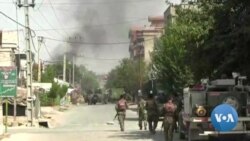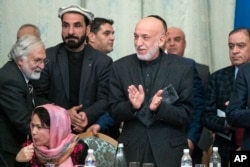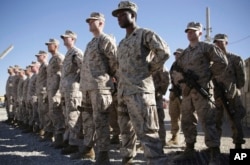The top U.S. negotiator in peace talks with Afghanistan’s Taliban leaders says he hopes a peace agreement can be achieved before Afghanistan’s next set of elections just five months away.
Zalmay Khalilzad, U.S. special representative for Afghanistan reconciliation, spoke Friday to an audience at the United States Institute of Peace in Washington, apologizing for his scratchy voice.
“This is what 42 hours of talking with the Taliban can do to you,” he joked.
WATCH: Chance for Peace in Afghanistan Before July Elections
Khalilzad said he was hopeful a peace deal could be finalized before Afghanistan’s presidential elections in July, but warned that there remained “a lot of work” to do.
“We are at the early stages of a protracted process,” he said.
Working toward intra-Afghan talks
In Moscow Wednesday, two days of talks between the Taliban and Afghan political leaders ended, although no representatives from the current government of President Ashraf Ghani were in attendance, sparking anger in Kabul. The Taliban consider the Kabul government a Western puppet and has so far refused to directly negotiate with it.
The 10-member Taliban delegation has instead been meeting with almost 50 influential Afghans, including politicians, former jihadi leaders, civil society activists and former President Hamid Karzai.
The final statement issued after the talks in Moscow declared that a complete withdrawal of U.S.-led foreign forces from Afghanistan is the key to lasting peace in Afghanistan.
Khalilzad said the Russia-backed talks were positive as long as they helped facilitate intra-Afghan talks, not if they “polarize Afghans further.”
“I’m not seeking to monopolize” the Afghan peace process, Khalilzad said, adding that regional countries should play a role in the process.
Khalilzad, a former U.S. ambassador to Afghanistan, said Friday that the Taliban and Afghan government leaders must “sit across the table from each other and come to an agreement about the future of their country.”
He said there were indications that the Taliban could sit down with government representatives in a “multiparty format.”
Next Qatar talks in two weeks
Khalilzad attended a six-day meeting with Taliban leaders in Qatar last month and afterward reported “significant progress” in the negotiations, which culminated in a basic framework for a peace agreement. It called for the Taliban to prevent international terrorist groups from basing themselves in Afghanistan and for the United States to withdraw its forces from the country.
The Taliban have yet to make concessions on two key U.S. demands: implementing a cease-fire and agreeing to negotiate directly with Afghan government representatives as part of an Afghan-led, intra-Afghan peace process.
He and his team are scheduled to meet with the Taliban again in Qatar on Feb. 25 for more discussions.
“All sides have learned lessons from the past. So the time has come, they say, for an inclusive dialogue leading to an inclusive peace. That will not be easy. ... But it’s for the Afghans to negotiate with each other and accept each other,” he added.
Radio Free Europe/Radio Liberty contributed to this report.











